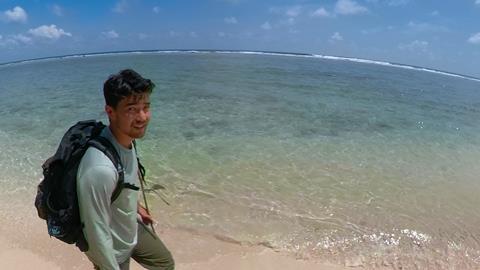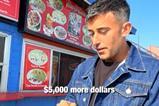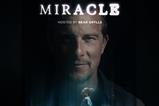In 2018, the death of missionary John Allen Chau shocked the world. Now, a new documentary looks at what inspired a young American to reach a remote people group with the gospel. It asks some important questions, says Tim Bechervaise, but have they really understood the Christian call to share the good news?

When 26-year-old American missionary, John Allen Chau, was murdered by the unreached tribe he was trying to tell about Jesus, it made headlines around the world.
Chau’s death on North Sentinel Island in 2018 prompted widespread debate over the theological, ethical and anthropological implications of his journey. Now, a new documentary, The Mission, which is produced by National Geographic, is reigniting these questions – and posing a few more.
“The story eventually killed him”
In seeking to explore the motives and morals behind Chau’s mission, the documentary unpacks his upbringing and detailed plan, and interviews a range of people, including friends and experts. It also features a letter from Chau’s father, who shares his son’s faith but not the “radical evangelical stream” that he feels inspired him.
One fascinating aspect of the film is what was out of bounds. North Sentinel Island is protected by a 5km nautical mile exclusion zone by the Indian government, making it illegal and dangerous to film, and no contemporary anthropologists have met anyone from it. The exact circumstances around John’s death are unknown, and his body has never been recovered.
Jesus tasked the Church with going to “all nations” while Revelation speaks of every tribe being reached with the gospel
Experts fill in some of these gaps, while “smudge-motion” animation recreates Chau’s mission, nodding to the colonial adventure stories that captured his imagination. “John became like a storybook character,” Amanda McBaine, one of the directors, told The Times. “He was trapped inside the story, and the story eventually killed him.”
Misleading on missions
These words perhaps hint at the directors’ own take on John’s mission, namely that he was caught in a futile fantasy. This is reinforced by the documentary’s strongest voice, Daniel Everett, a missionary of more than 20 years, who is now a staunch atheist: “To me it’s as if he has given his life for Zeus, Thor or Santa Claus. Because there’s no more reality to any of them than there is in his Jesus or God,” he says. Not exactly a take that will resonate with Christian audiences.
The documentary overplays Everett’s negative experiences of mission. Everett doesn’t “think it [mission] should be allowed”, and equates it with imposing our beliefs on others. In contrast, many would view mission as sharing the gospel - giving others an opportunity to voluntarily respond to the good news of Jesus Christ - and would highlight the many millions of people who have, over the centuries, received free healthcare, an education, been rescued from slavery or set free from drug addictions as a result of Christian mission.
Sadly, Everett’s one-sided view, which permeates the documentary, is not balanced out by other voices who may have offered a different perspective.
Unsettling viewing
Jesus tasked the church with going to “all nations” (Matthew 28:19) and to the “ends of the earth” (Acts 1:8), while Revelation speaks of every tribe being reached with the gospel (5:9). Jesus talked about taking up our cross (Luke 9:23) – the kind of words often used in the context of mission. Why? Because we hold that Jesus is “the way, the truth and the life” (John 14:6).
But what about when, as Chau knew, mission could result in death? How does the Great Commission apply when speaking of people who want nothing to do with the wider world? Particularly when these people groups have no immunity to common illness, and so contact with outsiders could expose them to fatal illnesses. And if they initially refuse – as the Sentinelese did, by firing an arrow into Chau’s Bible on his first attempt – is it right to return?
These are questions that make for uncomfortable – but perhaps necessary – viewing. It is good to really think about the gospel in light of the world we live in.
There’s much else that is done well in The Mission, such as the inclusion of moving excerpts from Chau’s diary and a beautiful portrayal of the vision Chau felt God give him (although it’s unclear why his his siblings were not featured, or his mother, who was more sympathetic to his mission than his father).
Foolish faith
From a Christian perspective, the documentary’s most striking feature is how it reinforces what Paul said about the cross being foolishness to the world (1 Corinthians 1:18). Chau loved Jesus. It may have been an imperfect love, perhaps one not without naivety, but Chau was compelled to live a life of sacrifice and to give a small group of people the opportunity to know that same love. We should admire that.
How do we reconcile the Great Commission with people who want nothing to do with the wider world?
Each year, millions of Christians count the cost of knowing Jesus, even in death. Chau’s story is different to these stories of persecution on many levels, but the same in one way: these Christians’ experiences of Jesus are so radically life altering, that they are willing to lay down their life for him. From the world’s perspective, that’s always going to be hard to grasp, hence the inherent weaknesses within this documentary.
The Mission is a captivating but unsettling watch, posing many questions that are central to the Christian faith. Despite its flaws, it’s one to watch – and one to ponder on.
The Mission is showing in selected UK cinemas. For more information see films.nationalgeographic.com/the-mission





































No comments yet